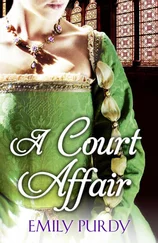The whole visit passed in this manner, with Jane turning a cold back upon our royal cousin, snubbing and rebuffing her every act of warmth and kindness, disdaining her generosity, greeting with hostility and contempt her every attempt to befriend her. When Cousin Mary sat down to sew with us and tell us stories of the saints’ lives, Jane would often claim a sudden upset stomach, an urgent need for the privy, sometimes even daring to loudly break wind to interrupt Cousin Mary’s stories, a rude punctuation on some saint’s work of wonder, before making her excuses and hastily leaving.
Another time, when Cousin Mary offered to teach us some exquisite embroidery stitches, Jane retorted that her skill would be better spent on plain straight stitches to make simple garments to clothe the poor. And when Cousin Mary introduced us to her confessor, Jane rudely turned her back on him and any other priest she encountered throughout our stay.
Every day she made a point of emptying her chamber pot from the window, onto the statue of the Virgin Mary in the rose garden below. And when Cousin Mary invited us to play cards, Jane stood up and preached a heated little sermon on the evils of gambling and swept the cards into the fire, denouncing them as the Devil’s tools for ensnaring souls. When Kate admired a pink pearl rosary and Cousin Mary gave it to her, Jane promptly snatched it, breaking the strand and cutting Kate’s hand so that it bled all over her new dress and gave her double the cause to weep. And, after that first night when Cousin Mary so lovingly dressed us, Jane refused to wear any of the finery our royal cousin had given her or any of the beautiful gowns our lady-mother had insisted that Mrs. Ellen pack either.
Throughout the Yuletide celebrations that marked the Twelve Days of Christmas and New Year’s Day, when gifts were exchanged, Jane appeared constantly in severe, unadorned black velvet, and each time made a point of standing near Cousin Mary with a frown on her face and contempt in her eyes to show up the difference between “the plain, godly garb that best becomes a Protestant maiden and our sour, old maid spinster cousin’s gaudy, overdecorated Papist fripperies.” No matter how sharply our lady-mother scolded or how hard the pinches and slaps, Jane would not draw a veil over her contempt for our Catholic cousin.
Cousin Mary stoically endured it all and did her best to ignore my sister’s insults and ingratitude, trying hard every time not to let the hurt show, smiling and behaving as though Jane’s conduct were flawless in every respect, sweet as sugar instead of hostile as a hornet, but she would never forget it, and we would not be invited to visit her again nor would she ever again grace us with her presence at Bradgate.
In March, after we had returned to Bradgate, Thomas Seymour, his handsome rogue’s smile long gone, laid his head upon the block and died, hoping to the last that his brother would send a messenger galloping up with a reprieve; even if it meant spending the rest of his life in prison, that was preferable to death. When our lady-mother, in her spice- and sweat-scented riding habit, swept in amongst a bevy of spotted hunting hounds, barking and howling with laughter as though she were one of them in human form, and repeated what Elizabeth had said when word of her paramour’s death was brought to her—“Today died a man of much wit but very little judgment”—Jane forced herself to stay still and show no emotion, to pull the needle through the cloth and go on with her embroidery as though nothing were wrong, when all she wanted to do was cry.
“For all her Tudor fire,” Jane said later when we were alone and it was safe for her to weep and show her grief, “Elizabeth’s heart is cold as ice!” And when she heard that after he died and his corpse was undressed a letter to Elizabeth was discovered hidden in the sole of his velvet slipper, Jane wept, inconsolable; his last words on this earth, hastily writ in his final hour, had been addressed to Elizabeth, not her. He had sent nothing to Jane, the one he claimed was his true love, not one token, not even a single word.
But Jane had to soldier along bravely, pretending nothing was wrong, hiding her head, and her sorrow, in her books, letting time pass and her heart heal, forcing herself to forget that love for a mortal man had ever dared trespass on that sacred ground where there was room for only God and learning.
Another year passed, then another, followed swiftly by two more, lulling me into contentment and complacency, the false belief that life would always go on in this lovely, lazy, humdrum way at Bradgate with occasional visits to the city. Our parents divided their time between London and the court and hosting wild and libidinous hunting parties at Bradgate that sometimes lasted for weeks at a time and were known for the excessive drunkenness, debauchery, and gambling that our parents and their guests—neighbours from the surrounding countryside and nobles down from London—freely indulged in. There were always dancing girls clad only in high leather riding boots who spun and twirled and slashed the air with whips, and the serving wenches and lads wore headdresses of wood carved to emulate antlers strapped to their heads and were hunted, pursued, and preyed upon by the drunken and lusty guests who even sometimes chased them out into the surrounding forest to drag them to the ground and couple with them like wild beasts.
The parties at Bradgate were so salacious they were even deemed scandalous by London standards, and many notables eagerly vied and angled to procure an invitation. At one such party our lady-mother and the other female guests climbed up to stand upon the table and raised their skirts high to show their legs, even above their garters, so that some important gentleman from London could present a solid gold apple to the lady he judged to have the loveliest limbs. And at another party, where everyone was terribly drunk, they decided not to risk the contents of their purses and instead used their clothes and gems as stakes. By dawn when I peeked out, both our lady-mother and father, as well as many of their guests, were stark naked, and many were nearly so. There was hardly a lady present with her gown still on or a man who had not lost his breeches.
I was always kept out of sight and away from these goings-on, but standing on my toes high above in the musicians’ gallery, I often peeked down into the Great Hall, curious to see what was going on. But Kate and Jane were often ordered to don their best and descend the stairs to entertain the guests with a musical recital, early in the evening of course, before the drunken lewdness was in full sway. Jane was a true prodigy and played the virginals, lute, harp, and cittern with great skill, but Katherine’s playing was more passionate and that, coupled with her vivacious beauty and smiling countenance, won her much applause and kisses and caresses from our parents and their guests. After she finished, Father would always call her over to sit upon his lap and feed her sweetmeats and dainty cakes and pat her coppery curls, our lady-mother would lavish her with praise, and some of their guests were so charmed by her they would pluck a gem from their lavishly apparelled person and present it to her. While Jane’s air of pious disapproval, with which she regarded our parents’ guests as she sat in morose and sulky silence after she finished playing, waiting to be dismissed, so she could rush back upstairs to shed her hated finery and return to her beloved books, earned her only angry words, slaps, and pinches.
There were occasional murmurs of marriage plans for Jane and the Lord Protector’s eldest son and namesake, Edward Seymour the younger, the Earl of Hertford, whom everyone called Ned. He was a likeable lad of fifteen, soft-spoken and rather reserved, but handsome beyond words, tall, slender, and hazel-eyed, with gleaming waves of golden brown hair, and a somewhat shy, but oh so charming smile. And when he truly smiled, broad and wide, with laughter in his eyes, he could light up a room. He came to visit us once, bearing letters from his father, and stayed overnight. Jane exhibited a rude disinterest. She donned her dullest gowns, addressed as few words as possible to him, speaking mostly in mumbled monosyllables, and pointedly settled herself in the window seat with her nose buried in her Greek Testament, curled on her side so that her back was turned to him, and refused to budge. And on the sly she downed a purge, so that when our lady-mother stormed in that evening in all her finery to drag Jane down to supper, she found the room stinking and Jane with her shift bunched up about her waist crouched over her chamber pot with a volume of Cicero balanced on her bare thighs.
Читать дальше












